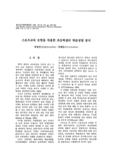

-
 * 본 문서는 배포용으로 복사 및 편집이 불가합니다.
* 본 문서는 배포용으로 복사 및 편집이 불가합니다.
미리보기
서지정보
· 발행기관 : 한국초등체육학회
· 수록지 정보 : 한국초등체육학회지 / 11권 / 2호
· 저자명 : 유정선, 문제민
목차
Ⅰ.서론
Ⅱ.연구방법
Ⅲ.결과 및 논의
Ⅳ. 결론
참고문헌
Abstract
초록
영어초록
This study aims at understanding and anlyzing deeply of the relations between the sports education model and the learning disposition of elementary school students by qualitatively analyzing the learning disposition of elementary school students applying sports education model.
First, teacher preferences were categorized as ' great teacher' , 'familiar teacher' and 'accompanying teacher' . These teacher preferences were from the study partivipators to partivipate in classes on their own by thinking and activating freely avoiding from the controlment and regulation, and it could achieve goals in learning such as improvement of ecercising function, fun, cooperations among team members, perseverance, doing one's best, sense of responsibility, etc as the various role plays and composing teams in physical educaion time and it brought positive thoughts as it was from the thoughts that the students can activate in stable and controlled learning mood y the class participation of the teachers, and the thought that they can learn new functions from the teacher.
Second, course preferences were categorized as 'joyful physical education ', ' confident physical education ' and ' challenging physical education ' These course preferences brought out positive thoughts that they had fun through competition among teams and felt satisfaction and achievement through the pelasance of victory , fair-play mind, cooperation among colleagues and improvement of exercise function , and came to know the importance of oneself in the team through team competitions, and could get achievement and confidence about physical activity.
Whereas, the partivipators of the study can feel confidence and satisfaction but they had limit in proficiency of basic functions, so it brought out negative thoughts that it hadn't given functional achievements to the partivipators of the study.
Third, learning attitude was categorized as 'autonomy and efforts' 'curiosity and understanding' 'institiute and exercise' These attitudes brought out positive thoughts that the partivimatores of the sudy partivipated actively in physical activities as the physical education classes were fun, and didn't act in an inappropriated way by the resomsibility about the role they took charge of though activities mainly by teams and participated actively to the physical
activities as the classes were fun, and perated the games and composed the teams by interest, and concentrated well haning curiosity in setting roles and learning one another. Whereas, the partivipators of the study had 2~3 extracurriularactivities such as institutes, learnig papers and special aptitude education afger classes, and they return home late, so it brought out negative thoughts that they had difficulty inpracticing.
참고자료
· 없음태그
-
자료후기
-
자주묻는질문의 답변을 확인해 주세요

꼭 알아주세요
-
본 학술논문은 (주)학지사와 각 학회간에 저작권계약이 체결된 것으로 AgentSoft가 제공 하고 있습니다.
본 저작물을 불법적으로 이용시는 법적인 제재가 가해질 수 있습니다. -
해피캠퍼스는 구매자와 판매자 모두가 만족하는 서비스가 되도록 노력하고 있으며, 아래의 4가지 자료환불 조건을 꼭 확인해주시기 바랍니다.
파일오류 중복자료 저작권 없음 설명과 실제 내용 불일치 파일의 다운로드가 제대로 되지 않거나 파일형식에 맞는 프로그램으로 정상 작동하지 않는 경우 다른 자료와 70% 이상 내용이 일치하는 경우 (중복임을 확인할 수 있는 근거 필요함) 인터넷의 다른 사이트, 연구기관, 학교, 서적 등의 자료를 도용한 경우 자료의 설명과 실제 자료의 내용이 일치하지 않는 경우
문서 초안을 생성해주는 EasyAI


